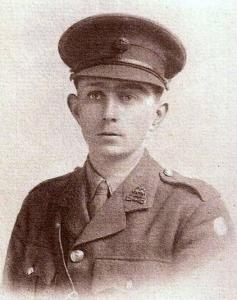
|

|
| Lieutenant Richard Victor Causton FREETH | |
|
2/4th Battalion Royal Berkshire Regiment Date of birth: 17th May 1897 Date of death: 13th July 1916 Killed in action aged 19 Buried at St Military Vaast Post Cemetery Richebourg-L’Avoue Plot III Row O Grave 11 |

|
| Richard Victor Causton Freeth was born at Latimore House, North Town, Maidenhead in Berkshire on the 17th of May 1897 the third son of Causton Freeth, an insurance company manager, and Laura (nee Sargeant) Freeth of “Riverdale”, River Road, Taplow in Buckinghamshire. He was educated at Lancing College where he was in News House from January to September 1912 and in Fields House until April 1914. He was a member of the Officer Training Corps. Following the outbreak of war he enlisted at Aylesbury as Private 2527 in the Buckinghamshire Battalion, Oxfordshire and Buckinghamshire Light Infantry on the 15th of September 1914. At a medical examination, which was held on the same day, it was recorded that he was five feet ten inches tall. He was posted to their Reserve Battalion on the 26th of September. He applied for a commission and was commissioned as a 2nd Lieutenant in the 2/4th Battalion Royal Berkshire Regiment on the 20th of October 1914. At 3pm on the 12th of July 1916 the 2/4th Battalion Royal Berkshire Regiment was relieved from the line at Ferme du Bois which they had been holding since the 6th of July. They marched to billets to the west of Croix Barbee to prepare for a major raid on the German trenches the following day. The raid was to be carried out by four officers and one hundred men of A Company. The purpose of the raid was the capture of enemy prisoners, the identification of the German units opposite and to inflict as many casualties on the defenders as possible in the time available On the 13th of July the attackers filed out into no man’s land from Pioneer Trench at 11.10pm and immediately came under machine gun fire from two enemy nests just behind the German lines. Two of the officers were wounded early in the advance and many of the men sought shelter in shell holes. The leading party managed to get to the German wire intending to blow a gap in it using Bangalore torpedoes but the fuses had been dropped which made them useless. 2nd Lieutenant James Skene found a gap in the enemy wire through which he and his party of eleven men passed while the next waves awaited developments. Skene was not seen again. Shortly after this the recall was sounded and the men retired. During the action Richard Freeth was supervising the firing of 185 rifle grenades in support of the assault and after the recall he volunteered with four of his men to go out into no man’s land to try to bring in the wounded. While he was in no man's land he was hit in the head by a machine gun bullet and killed; his body was brought in during the night. Casualties for the raid were one officer killed, one missing and three wounded with six other ranks killed, 11 missing and 15 wounded. A correspondent wrote:- "He had offered his services as a bomber in a raid, and he did splendid work, firing something like 250 bombs during the raid. When it was all over he reported and was told to go back to bed. On his way back he met the C.O. who told him there were still many wounded out in front. He at once said he would go and offer assistance, and he and four bombers set out over the trenches. It was then that he got hit through the head by a bullet from a machine gun. His body was brought in, and the whole platoon attended the funeral. They say that he died a hero and that he is a very great loss to the battalion. " Another wrote:- "From the time I joined, on February 8th, I saw quite a lot of your son. I found him such a quiet, steady, unassuming , manly young fellow, so keen on his work. He was very devoted to his men. He sacrificed his life in returning to help in bringing in his wounded comrades." His Company Commander wrote:- "He has been in my Company since September 1914, and during all that time he has shown the same keenness, attention to detail and kindliness. We all attended the simple soldier's funeral and we all hope that because he died in the finest way any man can- by giving up his life for others-that the irreparable loss will not come so hard." One of his NCOs wrote:- "In the death of Lieutenant Freeth we have lost an officer, a gentleman and a friend. It is difficult for one to say how much he was loved by all in his platoon. There was not one of us who would not have gone anywhere with him. His whole heart and soul was wrapped up in his work, and he died as he lived in trying to help others." He is commemorated on the memorial at St Nicholas' Church at Taplow in Buckinghamshire. His father applied for his medals in May 1921. |
|
| News House |
Back